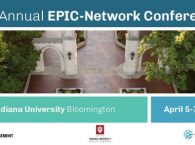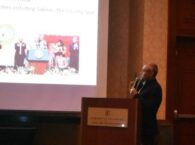University of Wisconsin-Madison’s EPIC program helps local, state, and national campaign to combat COVID-19

Author: Carl Nelson
Contributors: Marshall Curry, Gavin Luter
Researchers, staff, and students at the University of Wisconsin-Madison and the League of Wisconsin Municipalities design a communications campaign and a behavior survey to combat the spread of COVID-19.
The COVID-19 pandemic has dramatically transformed the way we live, work, and communicate. Now more than ever, we are turning to our professional and social networks in novel, remote ways for clarity and support. And while research and collaboration tactics have shifted, the students, staff, and faculty at our educational institutions are undeterred in their efforts to combat this public health crisis.
EPIC-N member program UniverCity Year (UCY), managed by the UniverCity Alliance (UCA), at the University of Wisconsin-Madison remains committed to building a more sustainable, liveable, and resilient world through hands-on partnerships between UW-Madison faculty and students and regional community partners. Prompted by the current situation, an interdisciplinary team led by UCY and UCA in collaboration with the League of Wisconsin Municipalities (LWM) has formed in an effort to #FlattenTheCurve, known as the “Do Your Part” Communications Task Force.
The task force has focused efforts toward a behavior change communications campaign with 4 components: (1) research into peoples’ attitudes and beliefs about COVID-19, (2) message and content creation and testing, (3) message and content distribution, and (4) on-going communications with local government leaders. The Task Force started with a 20-minute behavioral survey which aims to better understand public perceptions of the ongoing pandemic, specifically examining the reasons why individuals are or are not practicing shelter-in-place and social distancing. To date, over 37,000 individuals have participated. Initial results seem to indicate that while most people understand the benefits of these protective measures, work obligations or other structural constraints may inhibit them from isolating correctly. The group specifically collected information about the Wisconsin population, which will help drive messages for local governments.
Uniting university and community actors, UniverCity Year accomplishes an organizational feat.
The landmark survey, essentially a large scale data collection project and behavior change campaign, involves multiple moving parts. Organizing organizations include the Wisconsin Department of Health Services, the Wisconsin Agri-Business Association, the League of Wisconsin Municipalities, and Public Health Madison and Dane County. Participating entities at UW-Madison include COWS (the Mayors Innovation Project and UCY), the College of Agricultural and Life Sciences, the Wisconsin School of Business, the Global Health Institute, the Nelson Institute for Environmental Studies, the Morgridge Center for Public Service, the Departments of Psychology and Life Sciences Communication, the schools of Nursing, Medicine and Public Health, Letters & Sciences, and Human Ecology. Across these varied departments are students and faculty and students working in fields like behavioral psychology, communications, global health, and the health sciences.
During the planning phase, UCY was instrumental in uniting these university and community actors around a singular vision. Organizers divided over fifty faculty, staff and students into the working teams listed above. Now with a clear path forward, UCY continues to provide team members with resources and support wherever necessary. The group has already started creating content that can be shared, including a white board video targeting younger adults, artwork for children created with a UW alumni, talking points for local officials to use, and several social media accounts that are creating new content daily (See the Instagram, Facebook, Twitter, and YouTube accounts).
See drafted images with public health messaging for use on social media as part of the #DoYourPart campaign generated from this partnerhsip.
Physical distancing: a movement for mutual care and compassion
Respondents’ data will inform the design of a targeted social media campaign aimed at encouraging preventative behavior. The objective is to develop effective messaging which responds intelligently and empathetically to collective unease and uncertainty, including concerns about mental health in isolation. By reframing social distancing as “physical distancing,” for example, researchers hope to remind people that they can and should remain engaged with peers through digital social channels.
State and federal officials are enforcing distancing mandates in direct response to available data––the majority of individual COVID-19 cases with a known cause come from close contact with an infected person (CDC).
But repeatedly reinforcing the high risk of infection in medical terms is proving to be less persuasive than messaging which takes a moral, humanist position. The final campaign will leverage the broad reach of social influencers on various platforms in an effort to supplement and refine the familiar rhetoric coming from public health organizations and the government.
Harnessing the EPIC-Network to collect the best data possible
Now that the survey has been completed, which now provides a representative sample of the United States population, researchers can paint an accurate statistical picture of the entire nation’s populace. By sharing with other EPIC-N programs, UCY staff was uniquely equipped to raise awareness, accelerate survey distribution, and increase participation on a national-scale. EPIC-N’s contribution was invaluable to a successful distribution of the survey.
The EPIC Model is based on the belief that universities and local governments and communities can accomplish more when they share resources and ideas. This collaboration is a testament to that philosophy. By convening previously disconnected groups within and outside of the immediate university setting, UCY mobilized to deliver data-driven solutions amid an immensely disruptive global crisis. Members of the UCY and EPIC-N look forward to seeing the other unimagined ways universities can support their local governments and communities.
Learn more about how you can start an EPIC program in your community.


